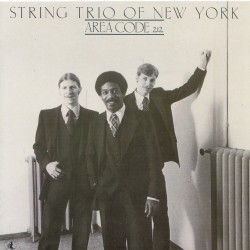




Polityka prywatności

Zasady dostawy

Zasady reklamacji
Soul Jazz / Avant Jazz
premiera polska: 07.03.2022
kontynent: Ameryka Północna
kraj: USA
opakowanie: Singlefoldowe etui
opis:
All About Jazz
Second LP of the Trio’s leaves the original notes intact, which seem a little odd at this juncture. Most of the space is spent to explain that you really can play jazz without horns, and many examples are given – yes, this can be jazz, really it can! The fact that this has been reissued should be indication that fans have accepted it. Today, Billy Bang and John Lindberg are stars; this engaging, challenging album will help explain that.
Lindberg starts “Twixt C and D” with a descending line, joined by James Emery’s guitar. Bang bows the theme on two strings – his tone is mostly classical, but he also gets earthy. Emery has a lengthy sol, and Bang is hummingbird-fast, but this doesn’t take off until Lindberg’s turn. He strums faster than Emery, going through ascending patterns with heightened speed, and then he goes strong, pounding the strings, playing with fire until the end, when the theme returns. It’s a pivotal moment, the Trio telling us “we’re here”. Throughout the disc, that point is made over and over.
“Strawberries” opens with Lindberg’s bow, groaning low as Bang goes high. There’s a spot of parallel bowing, then Bang takes a long descent, slurring his lines near the end. He swoops, then makes a high glissando. He becomes a clock with rhythmic plucking; Emery joins him, in time starting a counter line by plucks near the tuning pegs. Bang then stops; Emery’s solo is full of dashing fingers and frantic strums, a tension heightened when Bang returns, joining Emery in a high tremolo. Lindberg then cuts in with a great sawing noise (it later sounds like radio static!) The more you listen, the more you find the scraping has a tune to it, but its main effect is as a noisemaker. When Lindberg says his piece, the calm returns, and musically, you have gone far indeed.
“Echovamp 1678” is a gentle breeze, a pureline stated by Bang. Lindberg starts a tough 6/8 bass line, Emery comps a nice riff, and Bang gets more energy, first with a saucy tone and then with high wails and skittering strings. Like many of these, it features rapid mood swings, and dissonance among the melodies (or vice versa, depending on which you prefer.)
Emery begins his “Coho” with sour chords, and the bows heighten the tension. (Bang is mournful; Lindberg is just plain spooky.) All three leap in a tremolo, then the group seem to solo at once. (Bang is the most prominent and his part is lovely, but the others get credit as well.) While Bang has a sprightly two-note pattern, Lindberg starts scraping; in time Bang joins him for a manic duet (this is maybe Bang’s finest moment.)
“Bang’s Bounce” is a straightforward swinger with a good theme. (Of the tunes, Bang’s impress me the most.) Lindberg grinds at first, then repeats a short rhythmic phrase which returns to the theme. Emery’s solo is vigorous and mostly sticks to theme, with few of the frantic tangents he often indulges in. Bang’s turn is classical, and I think I hear a brief mention of “How High the Moon”. He then breaks the speed record, and it’s all Lindberg can do to keep up. It’s a great moment, and my ears are grateful.
“Abjunctinuity” is the most experimental tune: lots of scraping, tapping, and odd noises, including static from Lindberg and Bang. Emery sounds like Derek Bailey in spots, there’s a part where all three pluck, and then in gets terribly dense. The last minute is hot and heavy, full of fire and beauty at the same time. That describes the group in a nutshell.
Lindberg and Bang impress me a lot. Beneath this sound and fury you find intelligence, musicianship, and a surprising amount of order. Even on the furthest tangent you sense the group knows where it’s going, and that it will get there. Now, 18 years after the fact, it’s obvious they reached their goal, and the listened reaps the benefits.
AllMusic.com * * * * 1/2
muzycy:
Billy Bang, violin
James Emery, guitar
John Lindberg, bass
utwory:
A1. T'wixt C and D
A2. Strawberries
A3. Echovamp 1678
B1. Coho
B2. Bang's Bounce
B3. Abjunctinuity
wydano: 1980
nagrano: Recorded at Barigozzi Studio in Milano, Italy on November 25 & 26, 1980
more info: www.blacksaint.com
Opis